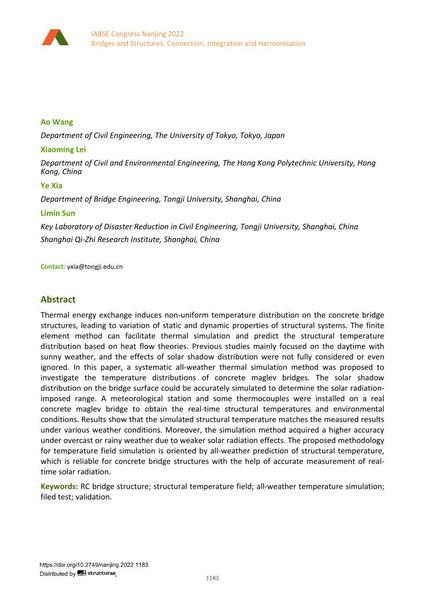Numerical and Experimental Study on the Temperature Distribution of an RC Maglev Viaduct Based on Meteorological Monitoring

|
|
|||||||||||
Détails bibliographiques
| Auteur(s): |
Ao Wang
(Department of Civil Engineering, The University of Tokyo, Tokyo, Japan)
Xiaoming Lei (Department of Civil and Environmental Engineering, The Hong Kong Polytechnic University, Hong Kong, China) Ye Xia (Department of Bridge Engineering, Tongji University, Shanghai, China) Limin Sun |
||||
|---|---|---|---|---|---|
| Médium: | papier de conférence | ||||
| Langue(s): | anglais | ||||
| Conférence: | IABSE Congress: Bridges and Structures: Connection, Integration and Harmonisation, Nanjing, People's Republic of China, 21-23 September 2022 | ||||
| Publié dans: | IABSE Congress Nanjing 2022 | ||||
|
|||||
| Page(s): | 1183-1190 | ||||
| Nombre total de pages (du PDF): | 8 | ||||
| DOI: | 10.2749/nanjing.2022.1183 | ||||
| Abstrait: |
Thermal energy exchange induces non-uniform temperature distribution on the concrete bridge structures, leading to variation of static and dynamic properties of structural systems. The finite element method can facilitate thermal simulation and predict the structural temperature distribution based on heat flow theories. Previous studies mainly focused on the daytime with sunny weather, and the effects of solar shadow distribution were not fully considered or even ignored. In this paper, a systematic all-weather thermal simulation method was proposed to investigate the temperature distributions of concrete maglev bridges. The solar shadow distribution on the bridge surface could be accurately simulated to determine the solar radiation-imposed range. A meteorological station and some thermocouples were installed on a real concrete maglev bridge to obtain the real-time structural temperatures and environmental conditions. Results show that the simulated structural temperature matches the measured results under various weather conditions. Moreover, the simulation method acquired a higher accuracy under overcast or rainy weather due to weaker solar radiation effects. The proposed methodology for temperature field simulation is oriented by all-weather prediction of structural temperature, which is reliable for concrete bridge structures with the help of accurate measurement of real- time solar radiation. |
||||
| Copyright: | © 2022 International Association for Bridge and Structural Engineering (IABSE) | ||||
| License: | Cette oeuvre ne peut être utilisée sans la permission de l'auteur ou détenteur des droits. |
||||

